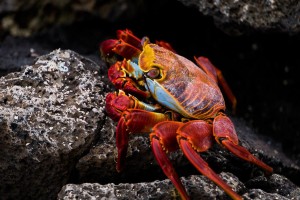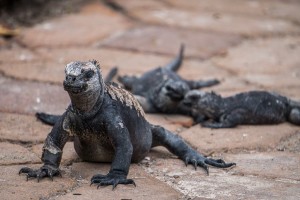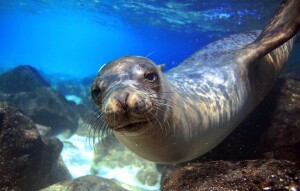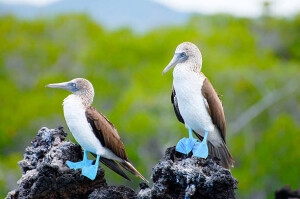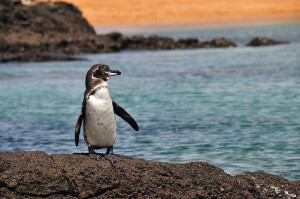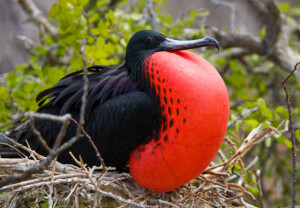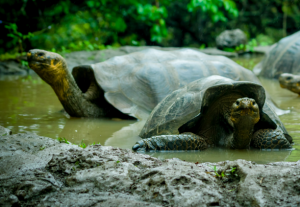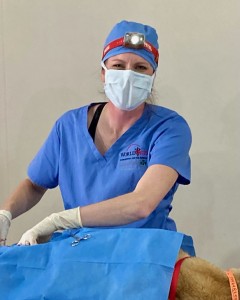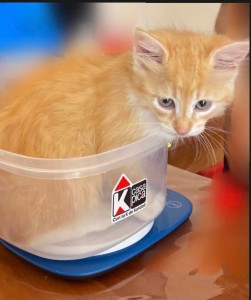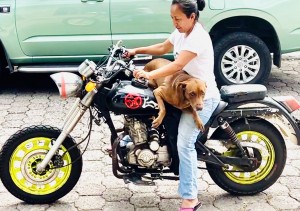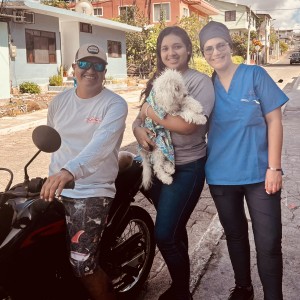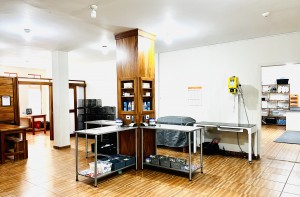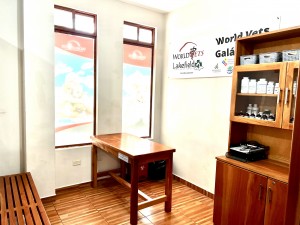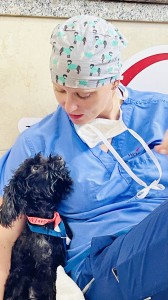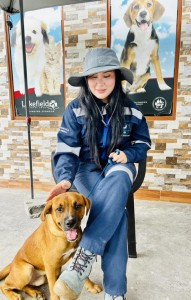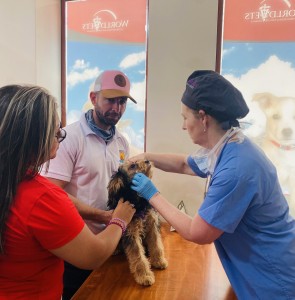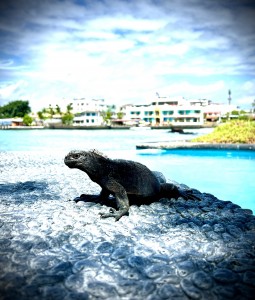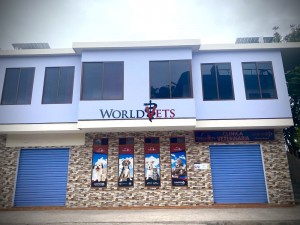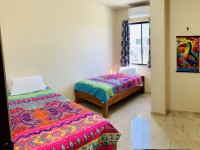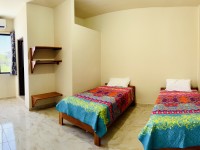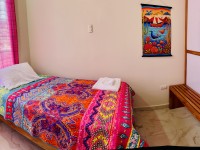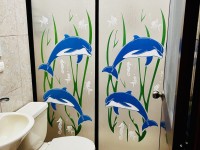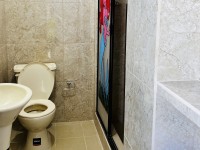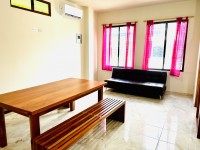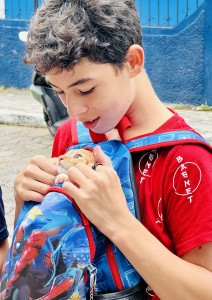 World Vets now has the opportunity for you to bring your own small group (3-5 people) for a private/exclusive volunteer opportunity at our veterinary clinic in the Galapagos Islands! Your team will spend a week running our community clinic, under the guidance of a leader from World Vets. This is not a high volume sterilization campaign, although there is the option to do some sterilization surgeries if desired. We will provide you with the necessary permits to volunteer in Galapagos.
World Vets now has the opportunity for you to bring your own small group (3-5 people) for a private/exclusive volunteer opportunity at our veterinary clinic in the Galapagos Islands! Your team will spend a week running our community clinic, under the guidance of a leader from World Vets. This is not a high volume sterilization campaign, although there is the option to do some sterilization surgeries if desired. We will provide you with the necessary permits to volunteer in Galapagos.
Our goal is to help protect the biodiversity of the Galapagos Islands while providing essential veterinary services, including medical consults and sterilization surgeries, for the resident dog and cat population. World Vets will be working in cooperation with local government agency ABG (Agencia de Regulación y Control de la Bioseguridad para Galápagos) and the municipality of San Cristobal.
We are proud to have Lakefield Veterinary Group as a long-time partner and our Founding Sponsor of our clinic in Galapagos! To learn more about our Conservation Medicine Program in the Galapagos read here.
Teams will be comprised of 3-5 volunteers. At a minimum your group must include one veterinarian, one technician and one other team member that could be a veterinarian, technician, assistant, or someone who speaks Spanish and can do Spanish/English translation. The project is best suited for a team with 1-2 vets and 1 LVT. Each group will be open for 1 to 2 vets, 1 or more techs (either licensed or non-licensed), as well as students (vet, pre-vet, and tech) or general assistants.
How much will it cost?
The project fee associated with this veterinary volunteer opportunity is $1975 USD per person. Teams will be able to reserve a specific week by submitting a $400 nonrefundable deposit. A registration and payment link will be provided for the volunteers in your group, which they will need to complete within 10 days. We suggest assembling your team prior to the first sign-up. We require a minimum of 3 volunteers that sign up as a team. Please ensure you do not have any scheduling conflicts that may impact your participation as deposits and project fees are non-refundable and/or non-transferrable to other trips and/or persons.
What’s included in the Project:
World Vets logo scrub top, volunteer kit, pre – trip planning and coordination per the project itinerary, accommodations for 8 days and 7 nights, airport transfers in San Cristobal per established meeting times on official arrival/departure days, ground transportation related to veterinary work, a group excursion/activity, veterinary and volunteer permissions and authorizations, as well as all supplies and full participation on the project. The apartment will be stocked at the beginning of your stay with food for self-made breakfasts (eggs, bread/pastries, yogurt, coffee, juice, fruit, granola, etc.)
What’s NOT included:
International/domestic airfare*, any meals not specified, optional excursions, travelers’ insurance, health insurance, World Vets membership fee, required travel documentation to enter/exit Ecuador (i.e. a passport that does not expire for at least 6 months from your initial date of travel, visa if applicable), incidentals and anything not specifically outlined as included.
*Go to the “Itinerary” tab above for more information about booking flights and reserving an overnight hotel in Quito.
Volunteer Permits for Galapagos
We will need to submit volunteer permissions for this project and will require your flight itinerary. Upon approval, each volunteer will be supplied with a passer-by certificate that waives the $100 Galapagos Park entrance fee and allows them to legally volunteer in Galapagos. You must enter on a volunteer permit (not a tourist visa) to participate in the project. To obtain passer-by certificates, we will need a high-quality copy of your passport ID page (png or jpg preferred), and vet license (if applicable), as well as the following information:
- International Arrival Date + Flight # + Arrival Time
- Galapagos Arrival Date + Flight # + Arrival Time
- Galapagos Departure Date + Flight # + Departure Time
After you register, you will receive a link to upload your information. Please keep in mind when booking your flights that volunteer permits will only allow you to arrive up to 3 days before and/or stay up to 3 days after the official project dates. If you have further questions about this, please inquire at trips@worldvets.org. Don’t delay in booking your flights and sending your information, as we will need all information about 5-6 weeks in advance.
What will I be doing?
This is a small animal veterinary service project. For this particular project, World Vets’ volunteer team can expect to participate in daily clinic activities, conduct health consultations, administer preventative care, perform sterilizations and other types of surgeries, and treat injuries or disease on a case-by-case basis.
Veterinarians
As a veterinarian, you may be involved in the following:
- Performing dog and cat sterilization surgeries
- Conducting health consultations, which may include preventative care, medical diagnosis, and/or treatment
- Performing other surgeries that may be deemed necessary on a case-by-case basis (based on your comfort level and/or ability)
- Providing instruction for your small group team members or local pet owners
The veterinarian volunteer category may be filled by a licensed DVM who is both competent and comfortable in performing routine spay/neuter surgery and medical diagnoses. PLEASE NOTE: We will require copies of veterinary licenses for veterinarians volunteering on this project.
Veterinary Technicians (Licensed and Non-Licensed) | Veterinary Nurses
As a veterinary technician, you will lead and/or be involved in:
- Preparing patients for surgery (surgical prep, monitoring vitals, administering pre-med/induction)
- Administering, monitoring, and managing the anesthesia given to surgical patients
- Monitoring surgical patient recovery and administering post-op care
- Assisting the clinic team with any other daily clinic activities
The “Tech” volunteer category may be filled by an experienced and competent veterinary technician, whether licensed or unlicensed. Please note, proficiency in core tech skills (e.g., IV catheter placement, blood draws, patient monitoring, drug administration, etc.) are essential in this position. Veterinary technicians should specify their veterinary title and related animal experience during registration.
Students
As a veterinary student, pre-veterinary student, and/or veterinary technician student, you may be involved in any of the following activities:
- Assisting with prepping patients for surgery (i.e. animal handling/restraint, expressing bladders, assisting with catheter placement, shaving and sterilizing surgical field, positioning patient for the surgeon).
- Assisting a veterinarian in surgery, cleaning up surgical area for the next patient and/or observing surgery. Note: Only veterinary students are allowed to participate in performing surgical procedures and only under the direct guidance and instruction of a veterinarian. Veterinary students can expect to assist with surgical procedures however they should not assume that this will be the main focus of their involvement during clinic.
- Monitoring patients after surgery, administering appropriate post-op medications under vet/tech supervision, and providing grooming for patients
The “Student” volunteer category may be filled by veterinary students, pre–veterinary students, and veterinary technology students. When registering, please classify your position on the registration form to reflect the student type that you are filling.
Assistants
The assistant volunteer category is open to anyone who loves animals and wants to help. Our assistant position requires no prior experience, just a willingness to learn! Assistants often help in the post operation recovery area and in a variety of miscellaneous duties (based on your skills, experience and comfort level).
- World Vets Galapagos Veterinary Clinic, San Cristobal Island
A few special notes:
COVID-19: The Galapagos Islands have a very high vaccination rate for all adults and a very low incidence of COVID. Nonetheless, the global pandemic presents an ongoing health and safety risk both in the United States and abroad and conditions and recommendations change frequently. Please refer to information on the US State Department website for travel to Ecuador as well as the CDC website for current information on international travel and health recommendations. Please read and fully understand the terms and conditions in the link below.
World Vets is not able to provide medical advice related to travel vaccines or other travel related medical questions. Volunteers are encouraged to consult with their family physician, nearest travel clinic and/or center for disease control regarding recommended immunizations and/or health precautions prior to the trip. It is recommended that volunteers be vaccinated for rabies for any international project, although is not a requirement for this particular project.
The gloves provided on World Vets projects are made with latex. Volunteers who have a latex allergy should plan to bring their own non-latex gloves.
Caps and masks are required to be worn by all surgeons as well as those assisting within the sterile field of the surgical patient. World Vets provides disposable caps and masks on field service projects, however, volunteers have the option of using their own surgical cap and/or mask.
Your group will have private accommodations. See the accommodations tab for details and photos of where you will be staying.
We highly recommend that you obtain travel and medical insurance for your trip. Global Rescue and MedJet are reputable providers of medical evacuation & advisory services as well as general travelers/trip cancellation insurance. You must read the policy wording to ensure the policy is a fit for your needs. Policies must be purchased prior to your initial registration in order to qualify- check with individual provider for details.
Please read and make sure you understand World Vets Terms & Conditions
For other general questions about volunteering with World Vets, please visit our Frequently Asked Questions page.
Itinerary
Before the Trip: Book Flights and Hotel
The destination airport for this project is San Cristóbal Airport in the Galapagos Islands, Ecuador (Airport Code: SCY). You will need to book international flights to Mariscal Sucre Quito International Airport (Airport Code: UIO), and then domestic flights from Quito to San Cristobal via LATAM and AVIANCA airlines. Most domestic flights from Quito to San Cristobal cost between $400 and $450, year-round. You might also look into Equair, which is a new domestic airline with limited flights and days but is less expensive. Domestic flights from Quito will usually have a short layover in Guayaquil (GYE), but passengers normally stay on the same plane, so a short layover is fine (it does not usually specify it is the same plane). Alternatively, you may choose to take an international flight directly to Guayaquil (GYE), and, from there, book your flight to San Cristobal.
(Airline Tip: Use “Google flights” to search for a flight that fits your personal choices, such as departure airport, preferred airline, layover times, baggage fees, price, etc. We suggest a 3 to 4-hour layover time for any international arrivals to give yourself enough time to get through customs before any connecting flights. Once you’ve found a flight selection that you like, we recommend that you reserve it directly through the airline company, instead of a third-party website. This can help reduce issues with cancellations, refunds, and flight delays.)
Most flights to Quito arrive late PM or very early AM the following day. We recommend you book an overnight stay at the Quito Airport Wyndham hotel, a business hotel across the street from the airport with a free shuttle that runs 24 hours a day. If the Wyndham hotel is already fully booked for the dates you need, we also recommend the Holiday Inn Quito Airport hotel, which is about a 5- to 10-minute ride from the airport, using the hotel’s free shuttle service. (We’ve found the best prices can be found through travel sites like booking.com and hotels.com.) If you are booking your flight to Guayaquil, you may or may not need to book an overnight stay, depending on your arrival time. Some flights to GYE arrive late at night, and some arrive in the morning.
Arrival Day
Fly to San Cristobal Airport (Airport Code: SCY), Galapagos Islands, Ecuador with a late morning or early afternoon arrival. Upon arrival to Galapagos, volunteers will be transferred to accommodations. You will have the remainder of the day to start exploring the town and local wildlife.
[Special note: Arrival/pick up transfers will only be provided from the San Cristobal Airport. Should any volunteers arrive via boat, they will need to get themselves to team housing on this date.]
Clinic Days + Orientation
You will work in the small animal clinic for four days, from 10 am to 2:30pm, allowing for free time in the late afternoon. There is the option to work extended clinic hours if you group chooses to do so (optional).
For some groups, orientation will be in the afternoon before the first clinic day. For other groups, orientation will be in the morning before clinic time starts.
Free Day + Half-Day Excursion
You will have a full free day to plan your own excursion. We highly recommend doing a “360 boat tour,” but you are free to choice and arrange your own excursion.
A half day tour (included with your trip fee) will give you opportunity to visit the Giant Tortoises, the highlands, Puerto Chino, and El Junco (a freshwater lake in an extinct volcano)
The work and free days will vary depending on which week you sign up for, but we can confirm the schedule with you ahead of time so you have time to pre-book a boat or day trip tour if you choose.
Departure Day and Official End of Trip
Depart Galapagos in the A.M. (San Cristobal to Quito) and arrive in Quito afternoon/early evening. Then depart Quito same day. Most flights are late evening or very early morning the next day (e.g., 12:30 am-1:30 am). Be sure to verify that the flight date is the next day if it is an early morning flight.
(Please note: the dates and schedule for work days may be subject to change.)
Accommodations
Accommodations are provided in a 3 bedroom, 2 bathroom apartment located above the clinic. The apartment is located in a local neighborhood with homes and businesses and a lively street food scene at night. It is less than a 5-minute walk from the beach and local shops and restaurants along the waterfront. Within one block you will also find a coffee shop, bakery, ice cream shop, laundry service (same day service for $1/kg), several convenience stores and a gym. The apartment has high speed internet (rare in Galapagos!).
Dine at any of the great restaurants along the waterfront or shop for fresh fruits and vegetables at the local mercado and stock up on essentials at one of the many local mini-markets to prepare your own meals at home. There’s also a fish market and two organic/health food stores nearby. The kitchen has all the essentials with a gas cooktop, fridge/freezer, blender, coffee pot and all the pots, pans, dishes, glassware and utensils you will need.
Your group will have exclusive use of the apartment during your stay.
- Bedroom 1 (two beds)
- Bedroom 2 (two beds)
- Bedroom 3 (one bed)
- Bathroom 1
- Bathroom 2
General Packing List
*NOTE: This is a general packing list.
Please research your project's forecast information for weather permitting items.
- Shoes (anything comfortable w/ covered toes for clinic days)
- World Vets scrub top (required during clinic days)
- Scrub pants (optional)
- Pants
- T-shirts (weather permitting)
- Shorts (weather permitting - shorts are ok for surgery)
- Bandana/hat
- Swimsuit (weather permitting)
- Sweatshirt (weather permitting)
- Light jacket (weather permitting)
- Pajamas
- Underwear
- Socks
- Sunglasses
- Water bottle (highly recommended)
- Headlamp (highly recommended)
- Camera
- Tote bag
Toiletries:
- Toothbrush
- Toothpaste
- Shampoo
- Prescription medications
- Over the counter meds (Tylenol, Imodium, cold meds etc)
- Personal bottle of hand sanitizer (highly recommended)
- Soap
- Sunscreen (highly recommended)
- Bug spray (DEET) (highly recommended)
- Brush
- Band-Aids
- Glasses/contact lenses
Extras:
- Beach Towel (if applicable)
- Ear Plugs
- Flip Flops/Shower shoes/Water shoes




